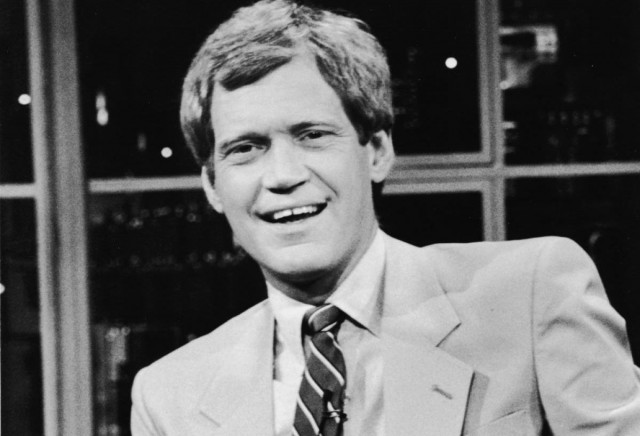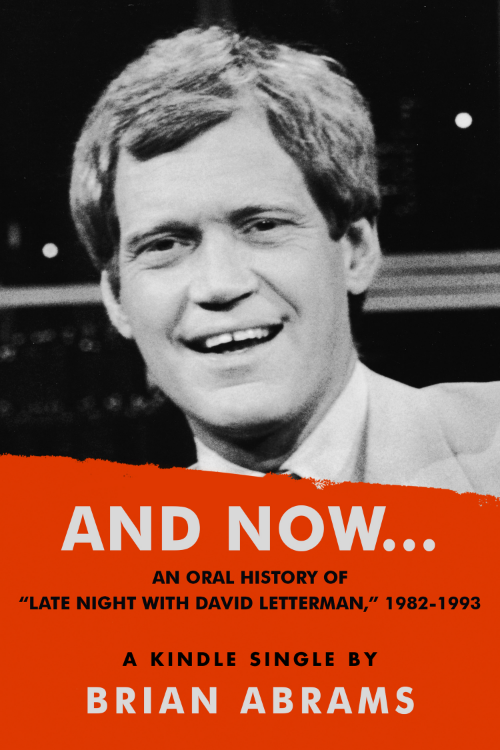Straight From the Writers Mouths, Author Brian Abrams Explores The Legacy of David Letterman’s NBC Show


“AND NOW…An Oral History of “Late Night With David Letterman” 1982-1993
Author Brian Abrams is fascinated with writers rooms, and there are few writers rooms in television that changed the game more than the team behind “Late Night with David Letterman.” That’s why when it became apparent that a retirement announcement would be forthcoming from Letterman sooner rather than later, Abrams took on the challenge of sitting down with the writers of the original incarnation of the show, which ran on NBC from 1982 until 1993. Abrams talked with an astounding number of the players who put together “Late Night.” The book details conversations Abrams had with Writers, producers, executives, guests, and crew, even musicians. Names like Richard Morris, Gerard Mulligan, Hal Gurnee, Merril Markoe, Rob Burnett, Ed Subitzky, Stephen Winer, Andy Breckman, Max Pross, Tom Gammill, Barry Sand, Jim Downey, Steve O’Donnell, Jeff Martin, Ted Greenberg, Randy Cohen, Kevin Curran, Joe Toplyn, Spike Feresten, Joe Furey, Sandra Furton, Jill Davis, and even Warren Littlefied, Brandon Tartikoff, and Fred Silverman who ran the network at the time. We talked with Abrams about the book, the Late Show, and the legacy of Letterman.
While Abrams would not dismiss the CBS years as unimportant, he agreed that “the legacy of Letterman is the NBC years, for comedy and for television, and especially late night tv.” Abrams explained that an entire generation of young people have no idea how influential Letterman was, in part, because the NBC years remain unreleased. “What he did is so much in the fabric of the day to day of the shows now,” Abrams said, “that you take for granted things that might happen on Kimmel or might have happened with Chelsea Handler, or even Fallon that just were– once up on a time an innovation.” For example, the idea that Kimmel is talking to his security guard may not seem unusual now, but there was a time, pre-Letterman, where moments like that didn’t happen. Yes, there were people before Letterman that would break down the fourth wall, like Mary Hartman, and Soupy Sales, or even Ernie Kovacs. But none to the extent of what happened on The Late Show.
 What Letterman did first, he explained, was look at what Carson and others were doing, and say, “hey this is all so ridiculous. No honest to god I’m just a guy in a suit in front of really expensive camera equipment and we’re in this ridiculous studio.” It’s not…just pulls the curtain back form that hollywood production and gave it that extra direction.” By bringing on guests like the nut lady from Connecticut, or Larry Bud Melman, or some schlub from Cleveland who was a file clerk, was to say “these people are just as important to sit in this chair, as whatever actor or actress is promoting their movie on Friday night. It’s supposed to be this reminder of, omg why are we worshipping all these stars, and what possibly could they say that’s anything more interesting than this guy. So its very much a dressing down of that.”
What Letterman did first, he explained, was look at what Carson and others were doing, and say, “hey this is all so ridiculous. No honest to god I’m just a guy in a suit in front of really expensive camera equipment and we’re in this ridiculous studio.” It’s not…just pulls the curtain back form that hollywood production and gave it that extra direction.” By bringing on guests like the nut lady from Connecticut, or Larry Bud Melman, or some schlub from Cleveland who was a file clerk, was to say “these people are just as important to sit in this chair, as whatever actor or actress is promoting their movie on Friday night. It’s supposed to be this reminder of, omg why are we worshipping all these stars, and what possibly could they say that’s anything more interesting than this guy. So its very much a dressing down of that.”
Of course Letterman loved Carson, so it wasn’t mean spirited, Abrams said. It was more of a parody, and homage that the same time. A generational change, where they felt that bringing on guest after guest to do “smiley question and answer things” did not feel authentic.
That innovation seemed to be less prevalent when Letterman moved to CBS, and Abrams believes three things contributed to the change. Steve O’Donnell stepping down as head writer, Barry Sand leaving as executive producer, and the change of venue from the small “clubhouse” vibe of the sixth floor of 30 Rock, to the Ed Sullivan theater. Once the venue changed, Abrams said “It becomes this grand thing and begins to feel like the very thing that they were making fun of in the first place.”
The book is a fascinating read, and takes you through the story of The Late Show, starting in 1979, four years before there was even a show, when Dave Letterman and his girlfriend and writing partner Merrill Markoe started working together on a morning show, that would lead to the creation of “Late Night with David Letterman.” Yes, the book covers the invention of the Top Ten list, what happened during the controversial Crispin Glover visit, and what inspired the famous 360 show, but it goes beyond the specifics to talk about the why and the how.
This Wednesday, Dave will retire from the last incarnation of his Late Night Career, “The Late Show with David Letterman” and in honor of the beginnings that changed television so pervasively, here are 10 great quotes from Abrams book. You can order “And Now…” on Amazon.com.
Five Great Quotes About “Late Night with David Letterman” From The Writers and Producers From The Amazon Kindle Single, “And Now….”
Read these and so many more in Brian Abrams outstanding must-read Kindle Single, “And Now…And Oral History of ‘Late Night with David Letterman.’ 1982-1993.”
Barry Sand, Executive Producer, 1980; 1982-87, “Letterman only cared if guests were going to be funny. If they were gonna be run-of-the-mill, “tell us about your movie” guests, I don’t think he was too interested in that. It wasn’t plug plug plug plug, you know? The motto we had on our show was “If you learned anything from our guests, we made a terrible mistake.”
Jeff Martin, Writer 1983-90, “Letterman’s personality really captured something at the time. Just a whole generation looked and said, “That’s it. That’s a really funny attitude.” I’d say irony. I’d say detachment from showbiz worship — entertainers honored to be in the presence of other entertainers. . . .It’s not “special people in showbiz on one side of the line and everybody else on another.” There’s a spirit of “We’re all a bunch of dopes in this together.”
Joe Toplyn, Writer 1983-90, Dave used to put it, or somebody put it on Dave’s behalf, that he liked the seams to show. If a prop wouldn’t work properly, then the camera operator would take a shot of the poor prop guy who was crouching behind the table and trying to squirt liquid through a hose. They enjoyed showing the viewing audience the seams and demystifying the process.
Randy Cohen, Writer, 1984-90, There were things you got to do there that were inconceivable anywhere else. [On September 25, 1986] we dubbed the show from English into English. No subtitles. We took a show that had already been shown. We transcribed it. We stripped the audio. We went into a dubbing studio, and we hired really good actors, the kind of actors who’d be called in to dub a foreign film– not funny voices, not goofy voices.
Spike Feresten, Writer 1990-93, The humor on Letterman that really appealed to me was the stuff that made absolutely no sense. One “viewer mail” letter asked, “What would life be like without the U.S. Constitution?” And Dave and Paul start thinking, and we go to the two of them tied to a stake and a giant rat in a purple wizard’s gown is whipping them for no reason.
Order “AND NOW…An Oral History of “Late Night with David Letterman,” 1982-1993 (Kindle Single) on Amazon
on Amazon
Read more comedy news, stories, interviews with comedians, videos and comedy clips on our home page. Get more comedy news. Watch more viral videos. Read more interviews with the best comics in the business.
.
